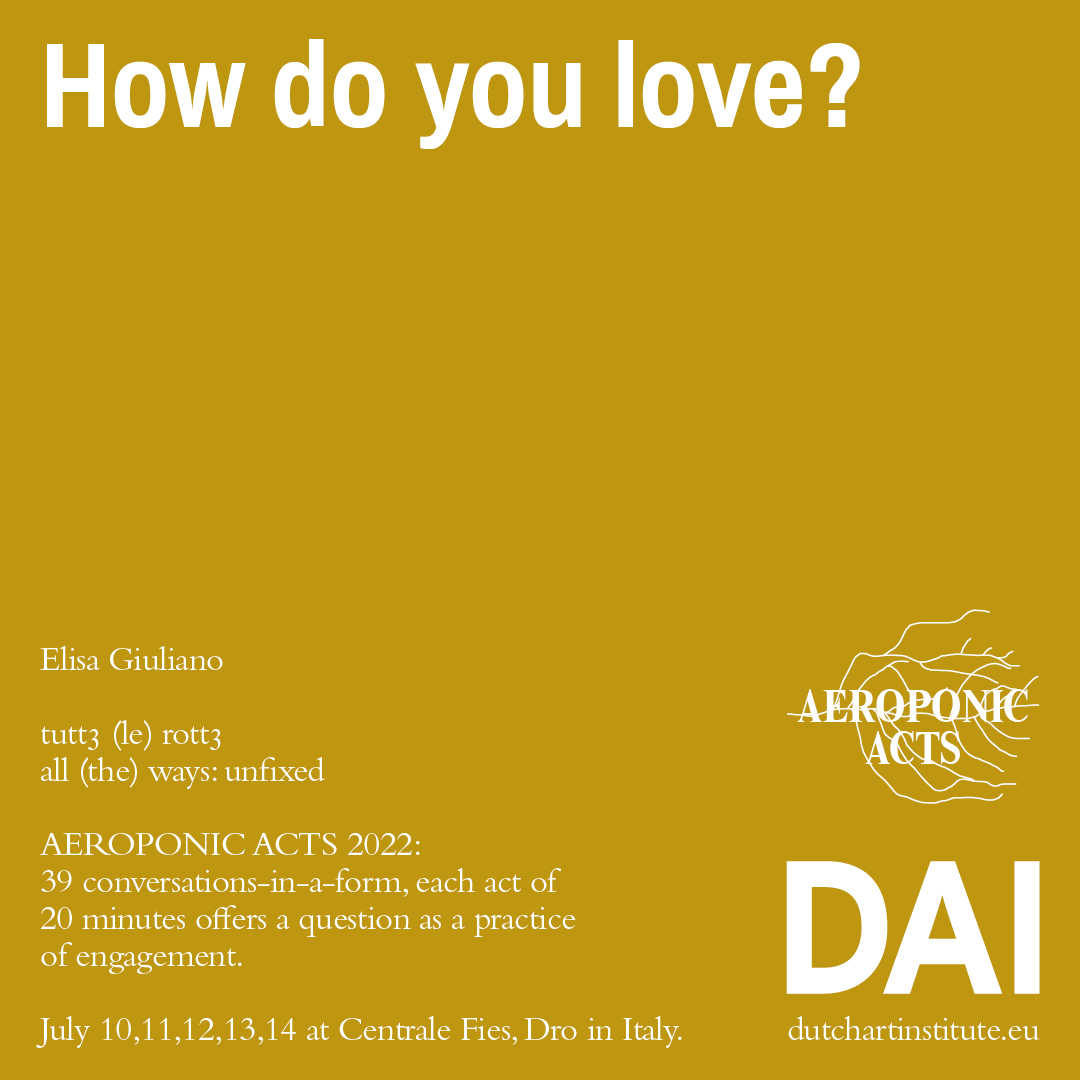Elisa Giuliano: Bella come te, in carne ed ossa come me (beautiful like you, in flesh and bones like me)
‘Aeroponic’ – root systems nourished by air – Acts is the name given to the nomadic Dutch Art Institute’s final Kitchen presentations. Each participant addresses one question, as a practice of engagement.
Here you will find the documentation of Elisa Giuliano's presentation as filmed by Baha Görkem Yalım. The written report is by Hubert Gromny and it includes a summary of the comments by esteemed guest respondents.
Bella come te, in carne ed ossa come me (beautiful like you, in flesh and bones like me)
Elisa's question: How do you love?
Elisa's introduction: A Sister mythologically represented, an ancestral sacra
More than god and all the saints together
Her voice burning in the hands like a blazing fire
Underground deity, goddess of harvest, fertility, and beyond:
Mary turns away from the land in Ephesus
Reject culture as ideology
Reject power that encompasses all aspects of social relations
Destroy the perpetual imprisonment of female subjectivity in the set of roles and identities
An oppression lost in the darkness of time and history that is nothing but "millennia of absence"
Gifts are brought and demands for protection, good fortune and well-being are placed
To discern the signs of irreducible alienation
Hubert's report: The chairs in the space are arranged creating a semi-stage situation, in which the audience is facing the movable stairs where the group of performers is sitting (Miiel Ferráez, Elisa Giuliano, Adriana Leanza, Chiara Pagano, Maud Gyssels, Dylan Spencer and Marika Vandekraats). On the right side of the room there is a white round table with two chairs and keyboard. On the back, near the entrance, movable scaffolding covered by black textile is located. Two performers wearing sunglasses act as bouncers on the doors letting people in. The performance unfolds itself in three parts. The first one begins with a procession in which performers bring the scaffolding from the back of the room in front of the audience. On the scaffolding, performer Laura Dubourjal, hidden under the black textile, is singing a pop song while other performers are carrying the structure in front of the audience. The second part begins after the arrival of the scaffolding and reveals Laura. Performers use various props, creating simple costumes in order to create a "tableau vivant"---the central figure (Laura) resembles an image of Virgin Mary wearing black robes. Other figures and characters invoking various iconographies surround her. The text is presented in the form of a sermon spoken by performer Miiel Ferráez, while he is facing the "living painting". The third part of the performance consists of two scenes happening simultaneously. In the middle of the scene the scaffolding is replaced by a table where a big group of performers engage with making a dough, which transforms into a playful flour-fight. On the right side of the stage, a performer (Felix Bahret) sits on the white table and acts as if waiting for somebody and being irritated by the absence of the person expected to accompany him. The Italian song sung by performer Ariana and played on the piano by Dylan gives the scene a humorous and cabaret-like feeling, touching upon popular and quotidian culture.
Momtaza Mehri noted that the performance was rich with content and intriguing in its unfolding. The act of procession established a divinity as a guiding figure of the presentation and proposed reflection on the notion of history of secrecy. Collective building of the tableau disturbed the canon of representation by putting various feminized deities into a conversation. Momtaza observed that this gesture provided an interesting framework to think about construction of female subjectivity through representation of a deity, which often feels to be passive and over-determined. Through a collective act of divination the performance pointed out to the womanhood as being a locus of meaning and specific kinds of valorization, which are oftentimes filled with aggression. Making references to Mina Loy’s “Feminist Manifesto” and the work of Roque Dalton, Momtaza moved to speak about the flour-fight and act of bread making as a lingua franca of domestic love. She closed the response by pointing out the improvisational quality of the performance and proposing further reflections on the passivity of representations of deities.
Chiara Figone reflected on the language created within the performance, which allowed to comment on the oppression, complicity and presence of Catholic church in everyday culture of Italy in a refreshing and original way. She noted that it is a very difficult task to subvert this language due to its strong complicity and entanglements between quotidian culture and Catholic Church traditions. Chiara observed that different elements rooted in these traditions such as theater or procession were ironically employed in the performance, which created a strong sense of an individual artistic voice able to speak about the role of religion and mythical narratives constituting the definitions of womanhood and love.
Phanuel Antwi pointed out that the performance felt to be very joyful and spoke about the importance to look at the process of making an art piece and mode of production as a joyful collaboration. In this presentation the process felt to be an inherent part of the piece. Phanuel noted that for the piece, which points towards the critique of certain traditions it is difficult to avoid being didactic, but the performance managed to do so. The close collaboration and relationships between performers were a key aspect for that. Phanuel spoke about the absence and stillness as two aspects present in the work especially during the construction of the living tableau. The continuous process of creating a still image allowed to visualize that stillness does not mean silence. The collaborative processes driven by love and joy and grounding them in humor provided an answer to the question posed by the presentation.
Elisa Giuliano's "Bella come te, in carne ed ossa come me (beautiful like you, in flesh and bones like me)" was presented before live audience at the Centrale Fies, Dro, Italy on July 11th.
Find the overview of all 24 AEROPONIC ACTS 2022 here: tuttə (le) rottə - all (the) ways: unfixed


